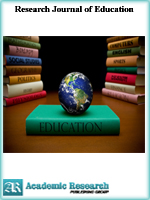Research Journal of Education
Online ISSN: 2413-0540
Print ISSN: 2413-8886
Print ISSN: 2413-8886
Quarterly Published (4 Issues Per Year)

Archives
Volume 8 Number 3 September 2022
Finding a Simple Solution to the Problem of Student Evaluations: An Index of Traditional Evaluation Questions
Authors: Derek Stimel ; Janine Lynn Flathmann Wilson
Pages: 70-79
DOI: doi.org/10.32861/rje.83.70.79
Abstract
Literature commonly finds student evaluations of economics instruction do not assess true teaching effectiveness. Many techniques improving learning outcomes result in lower student evaluations because students must work harder. Still, we often rely on a single overall rating for assessing teacher quality. We construct a model of student responses that indicate likeability of the instructor and difficulty of the instruction. We test the predictive power of these indicators using teaching evaluations of intermediate microeconomics instructors over five years alongside data on student grades in future courses that depend on intermediate microeconomics. Using these questions to construct a more meaningful evaluation of how well the intermediate microeconomic instructors prepare students to recall and use important concepts in the future improves our ability to evaluate instructor effectiveness.
Emergency Remote Education (ERE) Due to COVID-19 Pandemic: Teachers’ Perceptions on the Roles They Were Asked To Play
Authors: Marina Kougiourouki ; Zinovia Masali
Pages: 58-69
DOI: doi.org/10.32861/rje.83.58.69
Abstract
The suspension of the educational process imposed in all educational levels in many countries due to the rapid spread of the Covid-19 pandemic, together with the need for access to safe teaching, imposed an emergency and massive turn towards online education. This new condition came as a surprise to teachers, who were obliged to use new technologies for the design and the implementation of their teaching, as well as for the communication with and support to their students, changing thus not only the manner of teaching and learning but also the roles they were asked to respond to. The present paper, using semi-structured interview as a tool, studies the views of ten Greek teachers of primary education regarding their role in remote education in the emergency caused by this pandemic, the skills that helped them respond to these roles, the obstacles but also the assistance they encountered in their efforts. The research findings demonstrate that the teachers, with their patience and their persistence, utilized the limited knowledge they had and the ex post facto-acquired training they received, and - in cooperation with students, parents, but, above all, colleagues – made an effort to respond to the various roles they were asked to play.
Addressing the Anxiety of the Junior High School Students in Sta. Teresita National High School Amidst the Covid-19 Pandemic
Authors: Israeli D. Bonite ; Atena A. Rivera
Pages: 50-57
DOI: doi.org/10.32861/rje.83.50.57
Abstract
The threat of the Novel Coronavirus (COVID-19) is not solely focused on one’s physical health, it has also affected one’s mental health. Studies suggest that COVID-19 led to a heightened level of anxiety (Racine et al., 2021). This study attempted to assess the level of general anxiety, the anxiety caused by the COVID-19 pandemic, and academic-related anxiety of the junior high school students of Sta. Teresita National High School for the school year 2020-2021. An online survey was conducted utilizing the General Anxiety Disorder -7 (GAD-7) screening tool together with questions on COVID-19 and academic-related anxiety. The respondents of the study were 290 junior high school students, which were selected randomly from the total population of 1,179. The study showed that 53% of the male students experience only Minimal Anxiety, while 38% of the female students experience Mild Anxiety. Additionally, the data showed that the majority of the students (54.25%) have experienced an increase in anxiety due to the COVID-19 pandemic. It can also be noted that 44.14% stated that they were having difficulty adapting to the Modular (Printed) Distance Learning, 43.10% expressed difficulties in answering the Self-Learning Modules (SLMs) and 48.62% affirmed that they experience difficulty in concentrating on their lessons. To address the anxiety of the junior high school students, the proponents recommend the utilization of Project EASED (Easing Academic Stress Experienced During pandemic) to control the anxiety of the students through Art activities.



